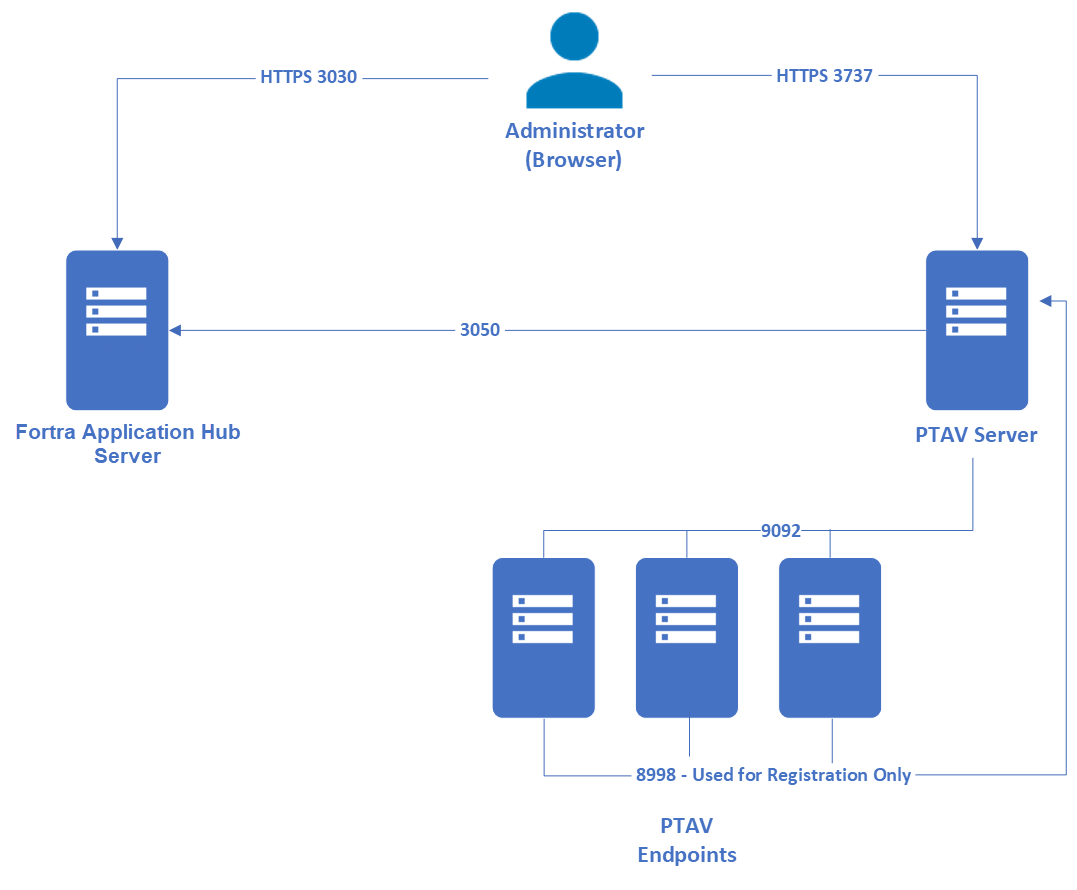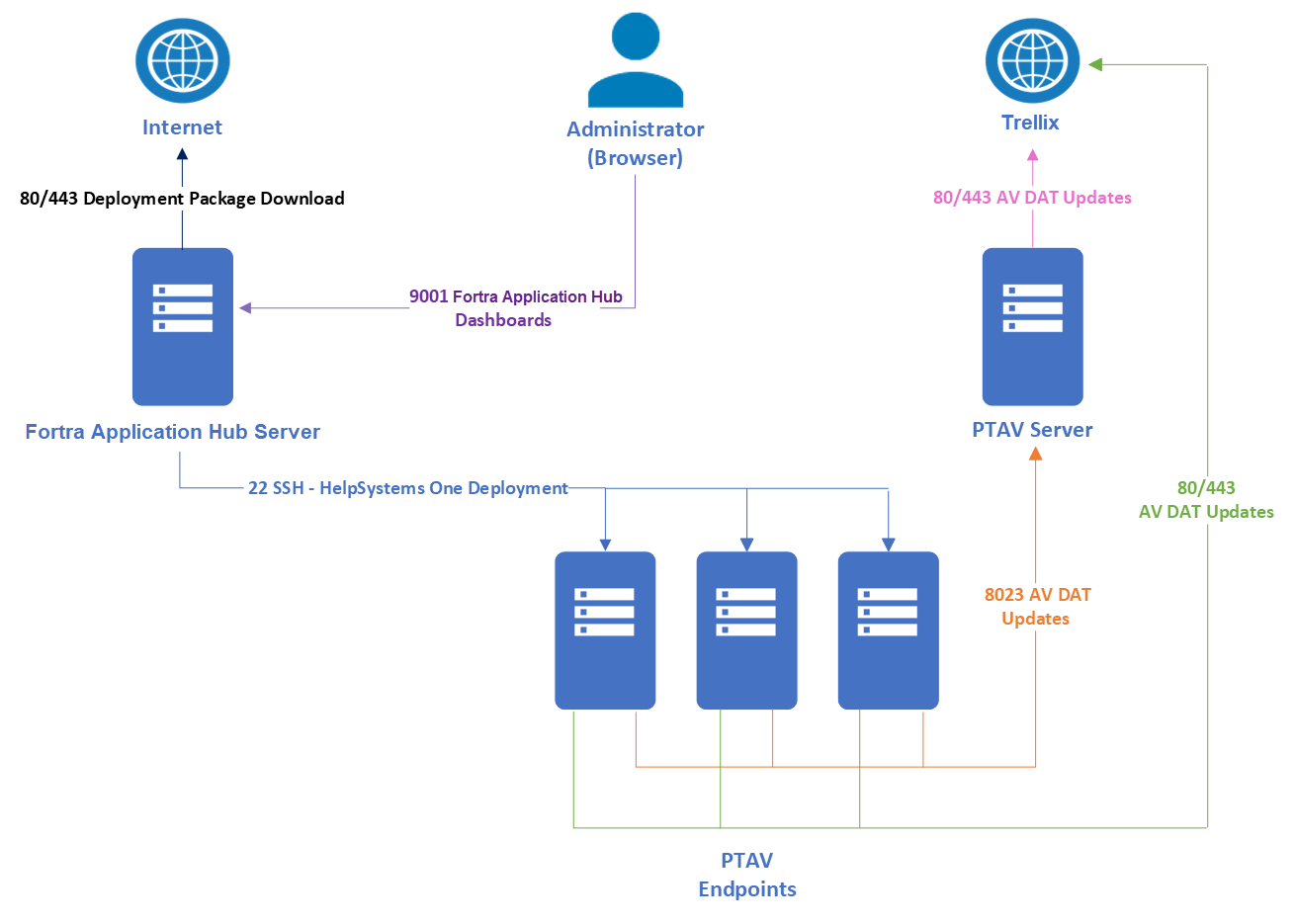Before You Begin
Read this section before you install Powertech Antivirus.
System Requirements
Prior to installing Powertech Antivirus, ensure you have installed Fortra Application Hub (preferably on a separate server), and your systems meet the following requirements.
Powertech Antivirus Server
-
Required Operating System
-
Red Hat Enterprise 8 x86_64
-
Red Hat Enterprise 9 x86_64
-
-
Required Packages
- perl-IO-Compress-Base
- perl-JSON
- perl-lib (RHEL 9 only)
- perl-File-Find (RHEL 9 only)
- perl-File-Copy (RHEL 9 only)
-
tar (typically installed by default)
-
openssl (typically installed by default)
-
Minimum Hardware Requirements
-
For up to 500 Powertech Antivirus connections:
-
16 GB RAM
-
50 GB free space
-
4 CPU
-
-
For up to 1000 Powertech Antivirus connections:
-
16 GB RAM
-
50 GB free space
-
8 CPU
-
-
| Requirement | Linux |
|---|---|
| 16 GB RAM | free -g |
| 50 GB free space | df -h |
| 4 CPU | lscpu |
Powertech Antivirus Endpoint
Linux
-
Red Hat Linux 6.9 (or later) for Intel x86_64
-
Red Hat Linux 7.1 (or later) for IBM Power little endian, or IBM Power big endian
NOTE: Red Hat Linux 8 does not support IBM Power big endian. -
Red Hat Linux 7.6 (or later) for LinuxOne s390x
-
SUSE Linux Enterprise Server 12 (or later) for Intel x86_64, or IBM Power
-
SUSE Linux Enterprise Server 12 (or later) for LinuxOne s390x
-
Ubuntu 16.04 (or later) for Intel x86_64
-
Ubuntu 20.04 (or later) for LinuxOne s390x
-
Approximately 2 GB disk space in /opt, 2.5 GB is recommended
AIX
-
IBM AIX 7.x
-
On-access scanning requires a minimum AIX 7.1 TL4
-
Approximately 2 GB disk space in /opt, 2.5 GB is recommended
Solaris
-
Solaris 10 for Intel or SPARC
-
Solaris 11 for Intel or SPARC
-
Solaris 11.4 is required for integration with Fortra Application Hub
-
Solaris 11.4 is required for on-access scanning support
-
Approximately 2 GB disk space in /opt, 2.5 GB recommended
Firewall Configuration
Use the following table and diagrams to determine how to configure your firewall. The ports are either required or optional. You must open required ports to use Powertech Antivirus. Depending on your setup, you might need to use an optional port(s).
| Source | Destination | Port | Protocol | Description | Required or Optional Port |
|---|---|---|---|---|---|
| Fortra Application Hub | Domain Controller | 636/389 | LDAP(s) over TCP | LDAP integration | Optional |
| Fortra Application Hub | Endpoints | 22 | SSH over TCP | Deployment via Fortra Application Hub | Optional |
| Fortra Application Hub | Fortra Application Hub download site | 80/443 | HTTPS over TCP | Deployment via Fortra Application Hub | Optional |
| Powertech Antivirus Server | Fortra Application Hub | 3050 | STOMP over web sockets | Connection to registration and messaging server | Required |
| Powertech Antivirus Server | Trellix Update hosts | 80/443 | HTTP(S) over TCP | DAT update from Trellix | Optional |
| Management Clients | Fortra Application Hub | 3030 | HTTPS over TCP | Access to Fortra Application Hub | Required |
| Management Clients | Fortra Application Hub | 9001 | HTTPS over TCP | Access to dashboards | Optional |
| Management Clients | Powertech Antivirus Server | 3737 | HTTPS over TCP | Access to Powertech Antivirus management web application | Required |
| Endpoints | Powertech Antivirus Server | 8998 | Kafka over TCP | Used by Endpoints to register against Powertech Antivirus Server | Required |
| Endpoints | Powertech Antivirus Server | 9092 | Kafka over TCP | Used by Endpoints to poll Powertech Antivirus Server for work and to report progress | Required |
| Endpoints | Powertech Antivirus Server | 8023 (or selected port) | HTTPS over TCP | Local DAT update. Can be configured post-installation. | Optional |
| Endpoints | FTP DAT Host | 21 | FTP passive or active | To distribute DAT updates to Endpoints via FTP | Optional |
| Endpoints | Trellix Update hosts | 80/443 | HTTP(S) over TCP | DAT update from Trellix | Optional |
Figure 1 - Required Ports
Figure 2 - Optional Ports
Other Required Software
- The command man to view online help.
Important Considerations
-
Fortra recommends the use of DNS Hostnames throughout the configuration of Powertech Antivirus to ensure the server and endpoints can correctly communicate with each other. Using a mixture of DNS Hostnames, IP addresses and server names can lead to a failure of the TLS handshake during registration as the endpoint may be expecting to connect to the server via a different configuration name than the one specified. Keeping all communication configurations set to the DNS Hostname reduces this risk.

